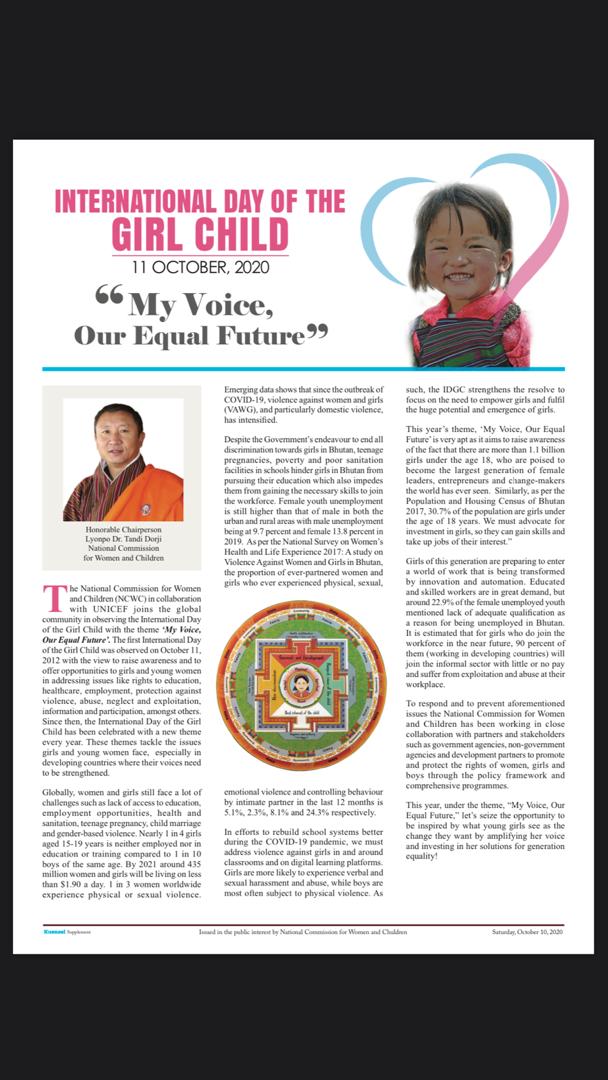International Day of the Girl Child, 2020

International Day of the Girl Child - ‘My Voice, Our Equal Future’ October 11, 2020
Message from Honorable Chairperson, Lyonpo Dr. Tandi Dorji, National Commission for Women and Children
The National Commission for Women and Children (NCWC) in collaboration with UNICEF joins the global community in observing the International Day of the Girl Child with the theme ‘My Voice, Our Equal Future’. The first International Day of the Girl Child was observed on October 11, 2012 with the view to raise awareness and to offer opportunities to girls and young women in addressing issues like rights to education, healthcare, employment, protection against violence, abuse, neglect and exploitation, information and participation, amongst others. Since then, the International Day of the Girl Child has been celebrated with a new theme every year. These themes tackle the issues girls and young women face, especially in developing countries where their voices need to be strengthened.
Globally, women and girls still face a lot of challenges such as lack of access to education, employment opportunities, health and sanitation, teenage pregnancy, child marriage and gender-based violence. Nearly 1 in 4 girls aged 15-19 years is neither employed nor in education or training compared to 1 in 10 boys of the same age. By 2021 around 435 million women and girls will be living on less than $1.90 a day. 1 in 3 women worldwide experience physical or sexual violence. Emerging data shows that since the outbreak of COVID-19, violence against women and girls (VAWG), and particularly domestic violence, has intensified.
Despite the Government’s endeavour to end all discrimination towards girls in Bhutan, teenage pregnancies, poverty and poor sanitation facilities in schools hinder girls in Bhutan from pursuing their education which also impedes them from gaining the necessary skills to join the workforce. Female youth unemployment is still higher than that of male in both the urban and rural areas with male unemployment being at 9.7 percent and female 13.8 percent in 2019. As per the National Survey on Women’s Health and Life Experience 2017: A study on Violence Against Women and Girls in Bhutan, the proportion of ever-partnered women and girls who ever experienced physical, sexual, emotional violence and controlling behaviour by intimate partner in the last 12 months is 5.1%, 2.3%, 8.1% and 24.3% respectively.
In efforts to rebuild school systems better during the COVID-19 pandemic, we must address violence against girls in and around classrooms and on digital learning platforms. Girls are more likely to experience verbal and sexual harassment and abuse, while boys are most often subject to physical violence. As such, the IDGC strengthens the resolve to focus on the need to empower girls and fulfil the huge potential and emergence of girls.
This year’s theme, ‘My Voice, Our Equal Future’ is very apt as it aims to raise awareness of the fact that there are more than 1.1 billion girls under the age 18, who are poised to become the largest generation of female leaders, entrepreneurs and change-makers the world has ever seen. Similarly, as per the Population and Housing Census of Bhutan 2017, 30.7% of the population are girls under the age of 18 years. We must advocate for investment in girls, so they can gain skills and take up jobs of their interest.”
Girls of this generation are preparing to enter a world of work that is being transformed by innovation and automation. Educated and skilled workers are in great demand, but around 22.9% of the female unemployed youth mentioned lack of adequate qualification as a reason for being unemployed in Bhutan. It is estimated that for girls who do join the workforce in the near future, 90 percent of them (working in developing countries) will join the informal sector with little or no pay and suffer from exploitation and abuse at their workplace.
To respond and to prevent aforementioned issues the National Commission for Women and Children has been working in close collaboration with partners and stakeholders such as government agencies, non-government agencies and development partners to promote and protect the rights of women, girls and boys through the policy framework and comprehensive programmes.
This year, under the theme, “My Voice, Our Equal Future,” let's seize the opportunity to be inspired by what young girls see as the change they want by amplifying her voice and investing in her solutions for generation equality!
All Updates
- Pilot Testing of Online Gender Training Module and Validation of TSM Feasibility Study
- 10th CEDAW Interim Progress Report Review Consultation
- Empowering Local Governance for Inclusive Planning and Budgeting: Addressing Issues Affecting Women and Children.
- Public Advisory Notification
- IDEVAW_Press Release 25th November 2024
- Understanding Basic Gender Concepts and Gender Mainstreaming tools - Gender Mainstreaming Training
- Training on Early Identification and Safe Referral of Children in Zhemgang
- Annual Gender and Child Focal Point Meeting
- NCWC - Executive Order
- NCWC Hosts Consultation Workshop to Develop Action Plan for 10th CEDAW Concluding Observations
- Asian Women Parliamentarian Caucus (AWPC), Thimphu, Bhutan 13th - 14th May, 2024
- Sensitization Program on Women's and Children's Rights for Members of Parliament.
- Suggestions and feedback on the Revised National Gender Equality Policy
- Orientation program-JSW School of Law
- Orientation program to the Community based and School Based Child Protection Committees.
